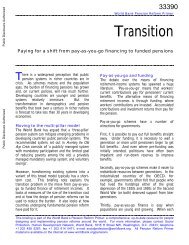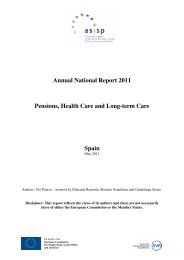Financial Sector Development in Africa: Opportunities ... - World Bank
Financial Sector Development in Africa: Opportunities ... - World Bank
Financial Sector Development in Africa: Opportunities ... - World Bank
You also want an ePaper? Increase the reach of your titles
YUMPU automatically turns print PDFs into web optimized ePapers that Google loves.
The Potential of Pro-Market Activism for F<strong>in</strong>ance <strong>in</strong> <strong>Africa</strong>: A Political Economy Perspective 223<br />
7. For a more extensive discussion, see, for <strong>in</strong>stance, Stiglitz and Weiss (1981).<br />
8. An early discussion of this argument is provided by Bhagwati (1971).<br />
9. The approach has been referred to as “modernist” because policies under this<br />
head<strong>in</strong>g aimed at govern<strong>in</strong>g f<strong>in</strong>ancial markets <strong>in</strong> the same manner as <strong>in</strong>dustrialized<br />
countries, focus<strong>in</strong>g, for <strong>in</strong>stance, on improv<strong>in</strong>g the macroeconomic<br />
environment and contractual and <strong>in</strong>formation frameworks <strong>in</strong> order to<br />
<strong>in</strong>crease access to large-scale f<strong>in</strong>ance for formal enterprises (see, for <strong>in</strong>stance,<br />
Honohan and Beck 2007, 7–12; Beck, Fuchs, and Uy 2009). Although the<br />
terms activism and modernism suggest a polarization <strong>in</strong>to two highly contrast<strong>in</strong>g<br />
and <strong>in</strong>compatible approaches to f<strong>in</strong>ancial policy mak<strong>in</strong>g, <strong>in</strong> most<br />
countries <strong>in</strong> the develop<strong>in</strong>g and the developed world activist and modernist<br />
approaches to f<strong>in</strong>ancial reform complement each other today. Moreover, as<br />
Honohan and Beck (2007, 12) po<strong>in</strong>t out, “sometimes it is not immediately<br />
clear whether certa<strong>in</strong> policies should best be considered modernist or activist.”<br />
This chapter uses these terms because they have become important reference<br />
po<strong>in</strong>ts <strong>in</strong> the debate on f<strong>in</strong>ancial <strong>in</strong>clusion, analogue to the terms<br />
structuralist/<strong>in</strong>terventionist and neoliberal/laissez faire <strong>in</strong> more general<br />
debates on the role of the state <strong>in</strong> the market.<br />
10. A detailed account of the challenges aris<strong>in</strong>g from f<strong>in</strong>ancial liberalization <strong>in</strong><br />
<strong>Africa</strong> is provided, for <strong>in</strong>stance, <strong>in</strong> the case study of Nigeria by Lewis and<br />
Ste<strong>in</strong> (1997).<br />
11. De la Torre, Gozzi, and Schmukler (2007) <strong>in</strong>troduced the term pro-market<br />
activism <strong>in</strong> the access debate; the term has been picked up by others (see, for<br />
<strong>in</strong>stance, Beck, Fuchs, and Uy 2009; De Luna-Mart<strong>in</strong>ez 2006; Ize, Pardo, and<br />
Zekri 2008). De la Torre, Gozzi, and Schmukler (2007) describe this new<br />
approach <strong>in</strong> detail, and many of the characteristics of activism presented <strong>in</strong><br />
this chapter are based on their concept. This chapter adopts a broad def<strong>in</strong>ition<br />
of pro-market activism because, as outl<strong>in</strong>ed at the beg<strong>in</strong>n<strong>in</strong>g of the section,<br />
activism is def<strong>in</strong>ed more broadly as the deliberate <strong>in</strong>tervention to promote<br />
the outreach of f<strong>in</strong>ancial services to groups of society which so far have been<br />
underserved. The term pro-market is used to contrast the current view with<br />
the market-replac<strong>in</strong>g approach prevail<strong>in</strong>g <strong>in</strong> the 1960s and 1970s.<br />
12. Consumer protection has emerged as an important reform area complementary<br />
to the field of f<strong>in</strong>ancial <strong>in</strong>clusion: efforts to expand f<strong>in</strong>ancial <strong>in</strong>clusion <strong>in</strong><br />
develop<strong>in</strong>g countries have allowed many new customers to access the formal<br />
bank<strong>in</strong>g system. Yet these new customers often have no experience <strong>in</strong> us<strong>in</strong>g<br />
bank<strong>in</strong>g services and lack an understand<strong>in</strong>g of f<strong>in</strong>ancial products, so they are<br />
more likely to pay excessively high <strong>in</strong>terest rates and bank charges, and<br />
become over<strong>in</strong>debted.<br />
13. One example is the <strong>in</strong>itiative by a public-private alliance for f<strong>in</strong>ancial <strong>in</strong>clusion,<br />
Banco de las Opportunidades, <strong>in</strong> Colombia. In their model, subsidies for







